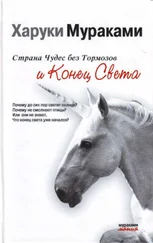Murakami, Haruki - Харуки Мураками
Здесь есть возможность читать онлайн «Murakami, Haruki - Харуки Мураками» весь текст электронной книги совершенно бесплатно (целиком полную версию без сокращений). В некоторых случаях можно слушать аудио, скачать через торрент в формате fb2 и присутствует краткое содержание. Год выпуска: 2014, ISBN: 2014, Издательство: Knopf Doubleday Publishing Group, Жанр: Старинная литература, на английском языке. Описание произведения, (предисловие) а так же отзывы посетителей доступны на портале библиотеки ЛибКат.
- Название:Харуки Мураками
- Автор:
- Издательство:Knopf Doubleday Publishing Group
- Жанр:
- Год:2014
- ISBN:9780385352116
- Рейтинг книги:5 / 5. Голосов: 1
-
Избранное:Добавить в избранное
- Отзывы:
-
Ваша оценка:
- 100
- 1
- 2
- 3
- 4
- 5
Харуки Мураками: краткое содержание, описание и аннотация
Предлагаем к чтению аннотацию, описание, краткое содержание или предисловие (зависит от того, что написал сам автор книги «Харуки Мураками»). Если вы не нашли необходимую информацию о книге — напишите в комментариях, мы постараемся отыскать её.
Харуки Мураками — читать онлайн бесплатно полную книгу (весь текст) целиком
Ниже представлен текст книги, разбитый по страницам. Система сохранения места последней прочитанной страницы, позволяет с удобством читать онлайн бесплатно книгу «Харуки Мураками», без необходимости каждый раз заново искать на чём Вы остановились. Поставьте закладку, и сможете в любой момент перейти на страницу, на которой закончили чтение.
Интервал:
Закладка:
He woke up, his body quaking. It took a while before he understood that it had been a dream. He tore off his sweat-soaked pajamas and dried himself with a towel, but no matter how hard he wiped the sweat away, he couldn’t rid himself of that slimy feeling. And he came to a realization. Or maybe felt it intuitively. So this was jealousy . The body or the heart of the woman he loved, or maybe even both, were being wrested from him by someone else.
Jealousy—at least as far as he understood it from his dream—was the most hopeless prison in the world. Jealousy was not a place he was forced into by someone else, but a jail in which the inmate entered voluntarily, locked the door, and threw away the key. And not another soul in the world knew he was locked inside. Of course if he wanted to escape, he could do so. The prison was, after all, his own heart. But he couldn’t make that decision. His heart was as hard as a stone wall. This was the very essence of jealousy.
Tsukuru grabbed a carton of orange juice from the fridge and drank glass after glass. His throat was bone dry. He sat down at the table and, watching through the window as the day slowly dawned, willed himself to calm down. This surge of overpowering emotion that had struck him had his heart and body trembling. What in the world could this dream mean? he wondered. Was it a prophecy? A symbolic message? Was it trying to tell him something? Or was this his true self, unknown to him until now, breaking out of its shell, struggling to emerge? Some ugly creature that had hatched, desperate to reach the air outside?
Tsukuru Tazaki only understood this later, but it was at this point that he stopped wanting to die. Having stared at his naked form in the mirror, he now saw someone else reflected there. That same night was when, in his dreams, he experienced jealousy (or what he took for jealousy) for the first time in his life. And by the time dawn came, he’d put behind him the dark days of the previous five months, days spent face-to-face with the utter void of extinction.
He speculated that, just as a powerful west wind blows away thick banks of clouds, the graphic, scorching emotion that passed through his soul in the form of a dream must have canceled and negated the longing for death, a longing that had reached out and grabbed him around the neck.
All that remained now was a sort of quiet resignation. A colorless, neutral, empty feeling. He was sitting alone in a huge, old, vacant house, listening as a massive grandfather clock hollowly ticked away time. His mouth was closed, his eyes fixed on the clock as he watched the hands move forward. His feelings were wrapped in layer upon layer of thin membrane and his heart was still a blank, as he aged, one hour at a time.
Tsukuru gradually began to eat again. He bought fresh ingredients and prepared simple, decent meals. Still, he regained only a little of the weight he’d lost. Over nearly a half year’s time his stomach had drastically shrunk, and now, if he ate more than a fixed amount, he threw up afterward. He started swimming again early in the mornings at the university pool. He’d lost a lot of muscle, got out of breath when he went up stairs, and needed to regain his strength. He bought new swim trunks and goggles, and swam the crawl every day, between 1,000 and 1,500 meters. Afterward he’d stop by the gym and silently use the machines to train.
After a few months of decent meals and regular workouts, he’d mostly recovered. He had the muscles he needed (though he was muscular in a very different way from before). His posture became erect, not slouched, and the color returned to his face. For the first time in a long time, he even had stiff erections again when he woke up in the morning.
Around this time his mother paid a rare visit to Tokyo. She found that Tsukuru had started to act and speak a little oddly, and, after he hadn’t been home for New Year’s, she decided to go to check up on him. When she saw how much her son had changed in the space of a few months, she was speechless. But Tsukuru attributed it to “normal changes you go through when you’re my age.” What he really needed, he told her, were clothes that actually fit him now, and his mother totally accepted his explanation. She’d grown up with a sister and, after her own marriage, was more familiar with how to raise her daughters. She had no idea how to raise a boy, and so Tsukuru convinced her that his changes were normal developments. She happily took him to a department store to buy new clothes, mostly Brooks Brothers and Polo, the brands she preferred. His old clothes they either threw away or donated.
His face had changed as well. The mirror no longer showed a soft, decent-looking, though unthreatening and unfocused boy’s face. What stared out at him now was the face of a young man with cheekbones so prominent they looked as if they’d been chiseled by a trowel. There was a new light in his eyes, a glint he’d never seen before, a lonely, isolated light with limited range. His beard suddenly grew thicker, and he had to shave every morning. He grew his hair out, too.
Tsukuru didn’t particularly like his new looks. Nor did he hate them. They were, after all, just a convenient, makeshift mask. Though he was grateful, for the time being, that it wasn’t the face he’d worn before.
In any case, the boy named Tsukuru Tazaki had died. In the savage darkness he’d breathed his last and was buried in a small clearing in the forest. Quietly, secretly, in the predawn while everyone was still fast asleep. There was no grave marker. And what stood here now, breathing, was a brand-new Tsukuru Tazaki, one whose substance had been totally replaced. But he was the only one who knew this. And he didn’t plan to tell.
Just as before, he made the rounds sketching railroad stations and never missed a lecture at college. When he got up, he’d take a shower, wash his hair, and always brush his teeth after eating. He made his bed every morning, and ironed his own shirts. He did his best to keep busy. At night he read for two hours or so, mostly history or biographies. A long-standing habit. Habit, in fact, was what propelled his life forward. Though he no longer believed in a perfect community, nor felt the warmth of chemistry between people.
Every morning he’d stand at the bathroom sink and study his face in the mirror. And slowly he grew used to this new self, with all its changes. It was like acquiring a new language, memorizing the grammar.
Eventually he made a new friend. In June, nearly a year after his four friends in Nagoya abandoned him. This new friend went to the same college and was two years younger. He met the man at the college pool.

He met the man at the college pool.
Like Tsukuru, the man swam by himself early every morning. They began to have a nodding acquaintance, and eventually, they started to talk. After changing in the locker room, they went out for breakfast together in the school cafeteria. The man was two years behind Tsukuru in college, and was majoring in physics. They were in the same engineering college, but students in the physics department and the civil engineering department were like beings from different planets.
“What exactly do you do in the civil engineering department?” the student asked him.
“I build stations,” Tsukuru replied.
“Stations?”
“Railroad stations. Not TV stations or anything.”
“But why railroad stations?”
“The world needs them, that’s why,” Tsukuru said, as if it were obvious.
“Interesting,” the man said, as if he truly felt that way. “I’ve never really given much thought to the necessity of stations.”
Читать дальшеИнтервал:
Закладка:
Похожие книги на «Харуки Мураками»
Представляем Вашему вниманию похожие книги на «Харуки Мураками» списком для выбора. Мы отобрали схожую по названию и смыслу литературу в надежде предоставить читателям больше вариантов отыскать новые, интересные, ещё непрочитанные произведения.
Обсуждение, отзывы о книге «Харуки Мураками» и просто собственные мнения читателей. Оставьте ваши комментарии, напишите, что Вы думаете о произведении, его смысле или главных героях. Укажите что конкретно понравилось, а что нет, и почему Вы так считаете.











